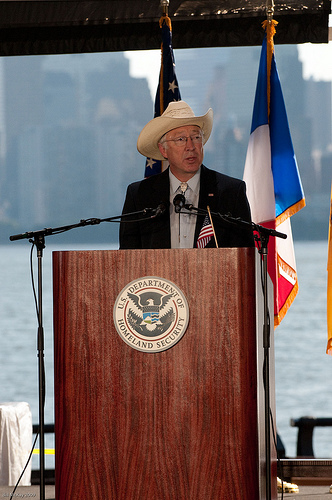In the weeks since BP’s Deepwater Horizon well started spewing into the Gulf of Mexico, there’s been increasing attention to the “cozy” relationship between the Minerals Management Service (MMS) and the oil industry it’s supposed to regulate. How cozy? Just last summer the Obama administration tapped a BP executive to serve as a deputy administrator for land and minerals management.
Interior Secretary Ken Salazar last June appointed Sylvia V. Baca to the post, which did not require Senate confirmation. The appointment follows eight years at BP. From her MMS bio:
Baca had been general manager for Social Investment Programs and Strategic Partnerships at BP America Inc. in Houston, and had held several senior management positions with the company since 2001, focusing on environmental initiatives, overseeing cooperative projects with private and public organizations, developing health, safety, and emergency response programs and working on climate change, biodiversity and sustainability objectives.
As Director of Global Health, Safety, Environment & Emergency Response for BP Shipping Ltd. in London, Baca led a worldwide team to develop innovative and proactive energy and the environment initiatives. Among her accomplishments, she oversaw health, safety and environmental outcomes for an $8 billion ship building program, resulting in the youngest, greenest and most technically advanced fleet in the world. The project has received numerous awards for its safety and environmental advancements.
Baca is also an excellent example of the revolving door between government and industry that MMS has been accused of facilitating. From 1995 to 2001, she was an assistant secretary for land and minerals management at the Department of Interior before leaving to work for the oil giant.
Last week, Salazar unveiled plans to split MMS into three agencies—one that will focus on energy development, another on enforcement and the third on revenue collection. But that doesn’t necessarily stop the spinning door between the beleaguered agency and the oil industry.
UPDATE: Salazar spokesperson Kendra Barkoff issued a statement noting that Baca, under federal government ethics standards, “has been and is recused from participating personally and substantially in any particular matter involving specific parties in which BP is or represents a party, for a period of two years following her appointment.” She also noted that Baca is not working on offshore drilling at the agency (her post deals with on-shore drilling).
Her appointment to the agency, however, doesn’t do much to help its industry-friendly reputation.













